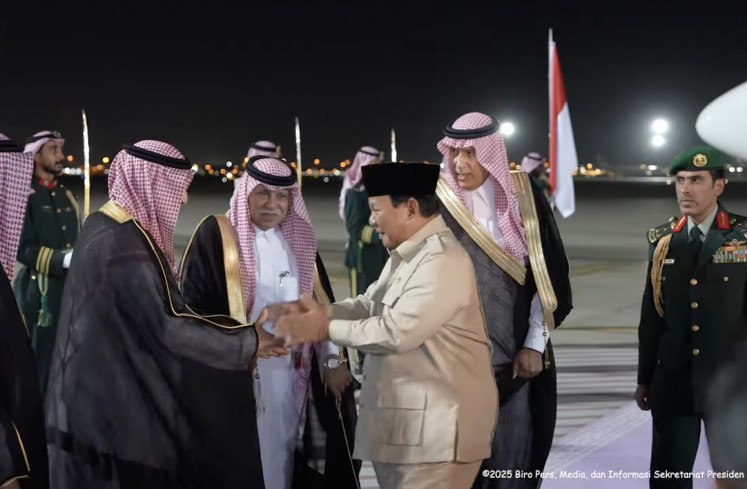Popular Reads
Top Results
Can't find what you're looking for?
View all search resultsPopular Reads
Top Results
Can't find what you're looking for?
View all search resultsIndonesia told to strengthen buffers, policy mix
While the global financial situation has been seen to stabilize in the last six months, Indonesia must strengthen buffers and its policy mix to counterbalance new downside risks that could potentially lead to capital outflows, the International Monetary Fund (IMF) has said
Change text size
Gift Premium Articles
to Anyone

W
hile the global financial situation has been seen to stabilize in the last six months, Indonesia must strengthen buffers and its policy mix to counterbalance new downside risks that could potentially lead to capital outflows, the International Monetary Fund (IMF) has said.
The fund has refrained from revising up its estimate for GDP growth in Indonesia this year — despite its optimism about the global economic conditions, as imminent challenges are seen in the form of fiscal imbalances in the United States and a shift toward protectionism.
IMF division chief for the Asia and Pacific department, Luis Enrique Breuer, said the capital flows could be volatile this year, as political and policy uncertainty in advanced economies could open new channels for negative spillovers.
“That’s why it is important for the country to protect its policy buffer: keep a good level of international reserves, keep the exchange trade flexible to allow the rupiah to move up and down depending on supply and demand considerations, and maintain prudent fiscal and monetary policies,” he said in Washington on Wednesday.
So far, Breuer explained, Bank Indonesia’s (BI) monetary stance was appropriate by leaving the benchmark interest rate unchanged since November.
“Again, it’s the right thing to do because of the higher uncertainties in the international financial market,” he said.
As for the right policy mix to address potential external financial volatility, the central bank must work with the government to protect economic growth and stability, as well as maintaining the inflation rate at a low level.
“The policy mix in the context of Indonesia involves, on the one hand, maintaining a level of fiscal deficit. Last year it was a bit over 2 percent of GDP, which is okay. The other, has to do with monetary policy allowing a flexibility in the exchange rate policy and that is what the authorities have been doing in the last few months,” Breuer said.
In its Global Financial Stability report, the fund warned that emerging markets—which include Indonesia—and developing economies remained at risk from a rapid rise in interest rates, US dollar appreciation and lower commodity prices.
“A sudden reversal of market sentiment could reignite capital outflows and hurt economic growth prospects, as could a global shift toward protectionism,” said IMF financial counsellor Tobias Adrian in a press conference.
Those risks could, according to IMF, exacerbate debt vulnerabilities and trigger the materialization of “contingent liabilities, in particular those related to implicit government guarantees on corporate borrowing.”
Therefore, Adrian called for the advanced economies, especially the US, to propose policies that aim not only at economic growth but also avoiding the creation of fiscal imbalances and negative global spillovers.
On the other hand, emerging market policymakers should address their external and domestic imbalances.
“That includes improving corporate-restructuring mechanisms, monitoring corporate vulnerabilities, and ensuring banks have healthy buffers,” he explained,
In its 2017 World Economic Outlook, the IMF set its forecast for Southeast Asia’s largest economy at 5.1 percent, unchanged from its earlier estimate made last year, affirming the government’s projection of the same level. It sees Indonesia’s annual growth rate at 5.3 percent in 2018.
“We think that many countries would love to grow by 5 percent. For large countries like Indonesia with a GDP that almost [reaches] a trillion dollars, growing 5.1 percent is very fast. Remember we are still living with the legacy from the global financial crisis in the US,” he said.
The growth estimate is being maintained even after US President Donald Trump ordered a probe of potential trade abuse, which has worried Indonesian businesspeople about a potential decline in the future trade surplus with the US.
“We don’t see any bilateral risk that is large in the trade relation between the US and Indonesia. We, in IMF, need to see concrete action to evaluate. We can’t speculate on what could happen. We haven’t seen anything concrete [from President Trump’s administration],” Luis said.
During their gathering in the US this week, world finance leaders are trying to nudge President Donald Trump’s still-evolving policies away from protectionism and show broad support for open trade and global integration.
The IMF and World Bank spring meetings bring the two multilateral institutions’ 189 members face-to-face with Trump’s “America First” agenda for the first time, just two blocks from the White House.
“These meetings will all be about Trump and the implications of his policies for the international agenda,” said Domenico Lombardi, a former IMF board official who is now with the Centre for International Governance Innovation, a Canadian think-tank, as quoted by Reuters.
He added that IMF Managing Director Christine Lagarde is aiming to “socialize” the new administration to the IMF’s agenda and influence its policy choices.
The IMF in particular has sounded warnings against Trump’s plans to shrink U.S. trade deficits with potential measures to restrict imports, arguing in its latest economic forecasts that protectionist policies would crimp global growth that is starting to gain traction.
Trump administration officials are now pushing back against such warnings by arguing that other countries are more protectionist than the United States.
Trump launched the week by signing an executive order to review “Buy American” public procurement rules that have long offered some exemptions under free trade agreements, and by lashing out at Canadian dairy restrictions.









